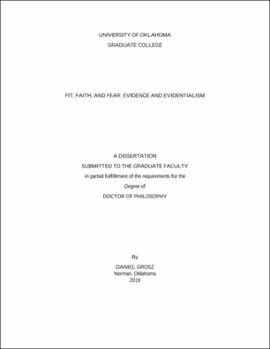| dc.description.abstract | This dissertation is an elaboration and application of evidentialism, the view that a proposition is justified for a person just in case it fits (is supported by) that person’s evidence. I elaborate on evidentialism by developing a view of the evidential fit relation. Some evidentialists claim that a proposition, p, fits one’s evidence, e, only if one is (potentially) aware of the explanatory connection between p and e. I argue by way of example that this version of explanationism fails. As a result, I suggest a friendly revision of explanationism that excludes an awareness condition. In addition, I field some objections to my version of explanationism.
I offer two applications of evidentialism. First, I apply a broadly evidentialist conception of justification, phenomenal conservatism, to a debate about the epistemology of religious experience. According to phenomenal conservatism, if it seems to a person, S, that p, then S has some justification for p, absent defeaters. Several authors utilize phenomenal conservatism to argue that some people have justification for certain religious propositions (e.g. that God exists), since these propositions sometimes seem true to them. I argue that, given the way these authors understand “seeming” states, phenomenal conservatism is mistaken. Sometimes a seeming can clash with experience (perceptual, introspective, memorial), in which case such a seeming lacks justificatory force. I go on to argue that seemings which are grounded in experience may be justificatory. However, the religious seemings mentioned so far in the literature don’t appear to be grounded in experience. I suggest that religious epistemology pay more attention to religious experiences, and less to religious seemings.
A second application of evidentialism assesses pluralistic ignorance, a social-psychological phenomenon in which an agent believes that their attitudes, feelings, and beliefs are different from those of others, despite the fact that their public behavior is identical. I argue that agents in standard cases of pluralistic ignorance are epistemically irrational. I accomplish this, first, by rebutting a recent argument for the rationality of pluralistic ignorance. Next, I offer a defeat-based argument against the epistemic rationality of pluralistic ignorance. Third, I examine a type of case in which the pluralistically-ignorant agent’s belief is irrational, despite the fact that this belief lacks a defeater. Finally, I consider instances of pluralistically-ignorant agents whose beliefs are not irrational, but explain why such cases are not problematic for my main thesis. This critical discussion allows me to offer an important amendment to an extant account of pluralistic ignorance. | en_US |
